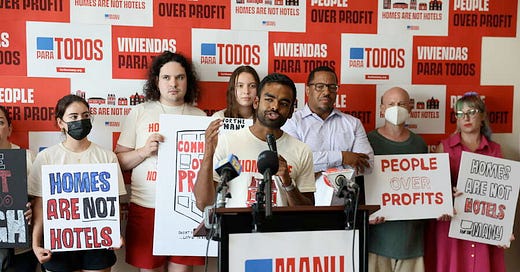Welcome to a premium Saturday edition of Progress Report.
Do you remember the late ‘90s TV drama called Early Edition? It starred a young Kyle Chandler, before he found his groove as the gruff, good-at-heart Coach Taylor in Friday Night Lights, as a guy named Gary who always got the newspaper a day early and had to try to fix problems before they actually happened? OK, it’s a somewhat niche reference, but what’s important here is that full Progress Report members are experiencing something similar to what young Gary experienced, without the burden of having to single-handedly reshape history.
Back in March, we reported on the nascent grassroots tenants movement rising on Florida’s Gulf coast, where activists in Tampa and St. Petersburg were defying slumlords and corporate landlords while pushing municipal governments to take real action on the crippling housing affordability crisis.
On Thursday, the Tampa City Council finally acquiesced to sustained pressure and agreed to put a very good rent stabilization measure on the ballot in November, creating an opportunity to create a significant precedent, help tens of thousands of working people, and force Ron DeSantis to publicly defend one of his biggest weaknesses.
When you have your ear to the ground and speak with people all over the country, you tend to have a better read of the public than the DC media. Along with getting out in front on policy issues, we’ve also been consistently months ahead of the Beltway on political strategy.
For example, back in March, I laid out the blueprint for a broad campaign narrative that I called the Republican War on Freedom. It was a way of tying together the GOP’s assault on “social” rights (abortion, book bans, LGBTQ+ rights) and its intensifying nullification of state and local democracy (overturning popular ballot initiatives, voter suppression, local pre-emption laws, etc.).
Two months later, after the leak of the Dobbs draft, former Obama comms guru and Pod Save America co-host Dan Pfeiffer suggested that Democrats focus on the “GOP War on Freedom,” which followed much of my framing. And then in mid-July, a New Republic columnist recommended that Democratic leadership makes the 2022 election about the “Republican War on Freedom,” which sounded like a pretty good idea to me.
The list goes on and on, and every time something we predict or suggest surfaces up to the national news, it reaffirms that the work we’re doing here is essential. Putting these ideas out into the world and drawing eyeballs to these issues can make a difference.
On that note, we’re working on a big and fun new multi-platform campaign, so if there’s a graphic designer or website builder that’s interested in helping us out, please get in touch!
OK, now on to a great new story about a rising trend in local and state policymaking that’s gone under the radar but could make a big difference for anyone that isn’t a private equity executive. While states and localities have been regulating Airbnb for years, the current housing shortage is fueling a new wave of regulatory action.
by Natalie Meltzer
Amid a housing affordability crisis across the country, residents and lawmakers are concerned that short-term rentals increase rents for long-term residents by taking units off the housing market and driving up demand.
In New York City, where the average rent is consistently hitting historic highs and the vacancy rate is reaching historic lows, there have been more apartments listed on Airbnb than available for rent.
The explosion of Airbnb has persisted despite legislation that requires hosts cannot rent an entire property for less than 30 days and that they must stay with their guests. According to the city’s Office of Special Enforcement, there are roughly 13,000 active illegal listings across the five boroughs.
“On a Brooklyn listserv I belong to, every few months someone asks about Airbnbing instead of renting their brownstone’s garden level,” said Curbed’s Kim Velsey.
Former New York City Comptroller Scott Stringer attributed over 9% of the city’s rent increases between 2009 and 2016 to Airbnb, with price pressures created by the platform forcing renters to pay an additional $616 million in 2016.
This dynamic is consistent across the country; one study found that both rent and house prices go up when Airbnb listings increase, and that Airbnb accounts for approximately 20% of those rental spikes.
The rise of short-term rentals also threatens the hotel industry, challenging the viability of a sector that employs thousands of unionized workers. Although Airbnb does not disclose data on listings or bookings, many argue that the overwhelming majority of units rented on a short-term basis are owned by investors who essentially run unlicensed, unregulated hotels in areas zoned for residential use.
The expansion of Airbnb as compared to hotels has significant tax implications: in the country’s 150 largest cities, the total state, county, and city taxes levied on hotel stays exceed 13%. But unless Airbnb has an explicit agreement with the city to collect and remit taxes on rentals through the platform, the company merely tells hosts to do so.
Even in localities where Airbnb has agreements, some local jurisdictions speculate they are banking only a quarter of the occupancy taxes owed. That is because the compliance is voluntary — in many of them, Airbnb does not need to substantiate the figures.
Keep reading with a 7-day free trial
Subscribe to Progress Report to keep reading this post and get 7 days of free access to the full post archives.







